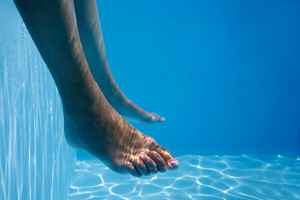 Plantar hyperhidrosis is a condition that causes excessively sweaty feet. It is fairly common, affecting 1-3% of the population. Plantar hyperhidrosis typically begins during childhood or adolescence. If you have this condition, you will find that both feet are often excessively sweaty, though the amount of sweating can range from mild to severe and constant. More severe cases of plantar hyperhidrosis can increase your risk of developing other foot problems, such as fungal or bacterial infections and friction blisters. If you suffer from plantar hyperhidrosis, there are many treatments available, including topical antiperspirants, iontophoresis, botox injections, and oral medications. To find out which treatments may be right for you, please consult with a podiatrist today.
Plantar hyperhidrosis is a condition that causes excessively sweaty feet. It is fairly common, affecting 1-3% of the population. Plantar hyperhidrosis typically begins during childhood or adolescence. If you have this condition, you will find that both feet are often excessively sweaty, though the amount of sweating can range from mild to severe and constant. More severe cases of plantar hyperhidrosis can increase your risk of developing other foot problems, such as fungal or bacterial infections and friction blisters. If you suffer from plantar hyperhidrosis, there are many treatments available, including topical antiperspirants, iontophoresis, botox injections, and oral medications. To find out which treatments may be right for you, please consult with a podiatrist today.
If you are suffering from hyperhidrosis contact Tanisha Richmond, DPM of Richmond Foot & Ankle, LLC. Our doctor can provide the care you need to attend to all of your foot and ankle needs.
Hyperhidrosis of the Feet
Hyperhidrosis is a rare disorder that can cause people to have excessive sweating of their feet. This can usually occur all on its own without rigorous activity involved. People who suffer from hyperhidrosis may also experience sweaty palms.
Although it is said that sweating is a healthy process meant to cool down the body temperature and to maintain a proper internal temperature, hyperhidrosis may prove to be a huge hindrance on a person’s everyday life.
Plantar hyperhidrosis is considered to be the main form of hyperhidrosis. Secondary hyperhidrosis can refer to sweating that occurs in areas other than the feet or hands and armpits. Often this may be a sign of it being related to another medical condition such as menopause, hyperthyroidism and even Parkinson’s disease.
In order to alleviate this condition, it is important to see your doctor so that they may prescribe the necessary medications so that you can begin to live a normal life again. If this is left untreated, it is said that it will persist throughout an individual’s life.
A last resort approach would be surgery, but it is best to speak with your doctor to find out what may be the best treatment for you.
If you have any questions please feel free to contact our office located in Dayton, OH . We offer the newest diagnostic and treatment technologies for all your foot and ankle needs.